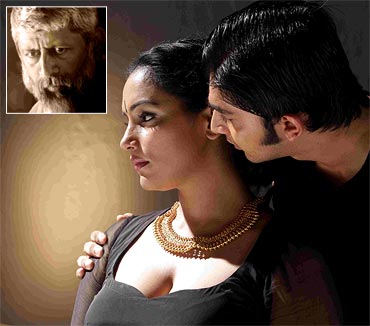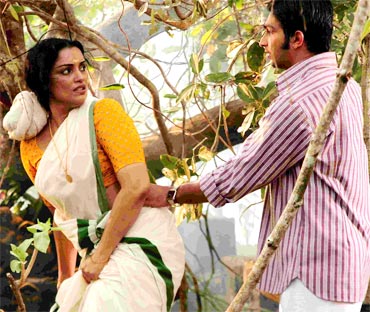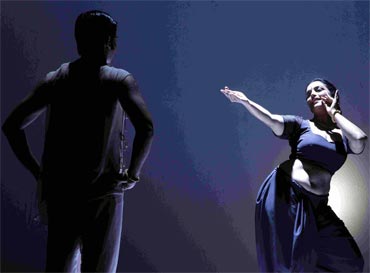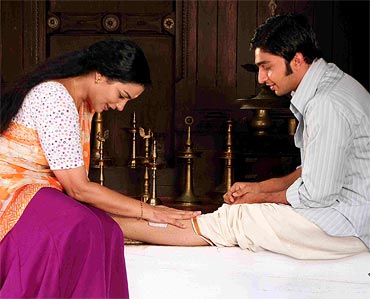 | « Back to article | Print this article |
Re-creating Rathinirvedam
With films like Chanakyan, Mahanaragam, Pavithram, Kannezhuthi Pottum Thottu and Shesham to his credit, director T K Rajeev Kumar took up the greatest challenge of his career when he started remaking Rathinirvedam.
The film has the rather sensitive theme of adolescent love, with a young boy falling for an older woman. The original version, which came out in 1978, was written by the late Padmarajan and was directed by the late Bharathan, with Jayabharathi and Krishnachandran in the lead roles. Rajeev Kumar's new version, which came out last week, has Swetha Menon and Sreejith Vijay playing the lead. The film is running to packed houses across the state right now.
Here's Rajeev Kumar explains how he met the challenge of re-creating a classic.
Why did you decide to remake Rathinirvedam?
Producer Suresh Kumar came to me with the idea of remaking Rathinirvedam. I was reluctant initially and the obvious reason was that the acclaimed Bharathan-Padmarajan team made the original version.
It is tough to make a re-creation, which is at par with the original. We were aware of that in our discussions but Suresh was seriously going ahead with the project. The way I made Kannezhuthi Pottum Thottu may have prompted him to ask me to direct the film.
'Our effort was to see if that curiosity could be presented in a different way'
What made you confident about the project?
I got hold of Padmarajan's original script of Rathinirvedam -- the unpublished version. Padmarajan conceived it as a story happening in a village focusing on the lifestyle of those times. But Bharathan had taken a different approach to the script and it came out successful as well.
I wanted to approach the script in a way that was different from Bharathan.
Also, when we think about the psyche of the viewer of the current generation, the subject is not at all outdated. The kind of relationship handled in the film still generates curiosity and still occurs. Our effort was to see if that curiosity could be presented in a different way.
What were the main concerns in your mind when you started thinking about the remake?
The main hurdle was that the images of the film were still in the minds of many viewers. So the option was to make the film forgetting the original version.
Luckily for me, most of those who worked in my film hadn't seen the earlier one. We decided to retain the striking imagery and to tell the tale in a subtle way, exploring the relationship more.
'KPAC Lalitha is the only artiste who is there in both the films'
So what was different from the original version?
The storyline is the same. But in our version, we have made the boy slightly older as we felt it would make more of an impact. So basically we are highlighting the relationship. It is not recreating the same scenes. Even when we make the same scene, we have changed the attitudes, positioning of the character and his mental state. We decided to narrate the story in a subtle way, but not affecting the original screenplay.
The story of a young boy's (Pappu) relationship with an older woman (Rathi) has been retained but the difference is in the way we have narrated it.
KPAC Lalitha is the only artiste who is there in both the films. She is now playing Rathi's mother. Pappu, who has an urban background, has come to the village for a vacation. Rathi is not married because she has a problem with her horoscope.
How did you place the story to connect with the current generation?
As I have said earlier, the situations are more subtle. There is no vulgarity and families can definitely watch it.
Why did you choose Swetha Menon to play the role of Rathi chechi?
We wanted an actor who would understand the real spirit of the story. With her exposure and intelligence, she could understand the character in the right way.
'I was more tense than ever for my first film'
How was Sreejith Vijay selected for the role of Pappu?
We had been searching for some time for an actor who could play this role. We wanted the boy to have an innate innocence and he had to display some silent reactions. Sreejith seemed perfect for the role.
What was your state of mind when making the film?
I was more tense than ever for my first film, as the original version has been made by two masters of the craft. The audience would naturally respond to my efforts in a negative way in the beginning and I was aware of it. The comparisons are obvious and I know that I will never come near those great men when it comes to talent. What I tried to do is to narrate the story in a different way.
There is definitely curiosity about the film and that is an advantage. The question is how much we can fulfill or rather cater to the curiosity. That is for the viewers to decide.



